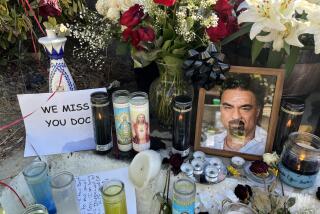Deathbed ID Seen as Key Evidence in Slaying Case
- Share via
Strapped to a hospital bed, near death, a tube down her throat, April Mahoney was unable to say the name of the man who shot her and killed a friend.
But Mahoney managed to nod affirmatively when she was shown a picture of the man who allegedly shot her outside her West Hills home, police say.
She nodded and her eyes welled with tears when she saw the picture of Randall Williams, according to police. Weeks later, on Dec. 24, 1998, Mahoney died.
“It was like God let her live that long so she could tell what happened,” Deputy Dist. Atty. Michael Duarte said.
Mahoney’s dying declaration will be one of the pivotal pieces of evidence in the upcoming capital murder trial of Williams and Kenneth Leighton.
They face the death sentence if convicted of killing Mahoney and James Navaroli, who was about to testify in a criminal case against Leighton.
Mahoney and Navaroli had been placed in a witness protection program but had left it before they were killed.
Jury selection, which is underway, is unusual because the two defendants will be in the same courtroom at the same time, but tried separately with two juries.
Prosecutors contend that Leighton, who was a defendant in an earlier burglary case, didn’t want Navaroli and Mahoney to testify against him. Leighton mistakenly believed that a burglary conviction would be his “third strike” and lead to a lengthy prison sentence, police said.
“Here you have the witnesses in [Leighton’s] case who were killed. He was a natural suspect in this case,” Duarte said.
Authorities allege that Leighton hired his friend, Williams, to do the killings.
*
Defense attorneys say that Leighton, 37, and Williams, 36, are innocent, that witnesses against them are not credible, and that the victims had other enemies who wanted them dead.
“The victims were drug users and drug dealers and police snitches and thieves,” said Deputy Public Defender Michael Gottlieb, who represents Williams. “The victims were extremely shady.”
Navaroli once told police he had turned in 15 drug dealers, Gottlieb said.
Duarte said there was “no documented evidence” that the victims had ever been police informants, and that the victims entered the police witness protection program only because Leighton threatened Navaroli.
In a phone conversation, according to court records, Leighton allegedly called Navaroli “a rat.”
“Don’t let me catch you driving down the street. . . . You’re dead and there’s nowhere you can go,” prosecutors have alleged Leighton said.
But inexplicably, the couple left the witness protection program despite police warnings not to return to West Hills, where Navaroli sold methamphetamine. They “pocketed the money and left the program,” Gottlieb said.
The couple were ambushed a month later, in November 1998.
The trial before Los Angeles County Superior Court Judge Terry A. Green is expected to last three or four months.
With two sets of juries, that means multiple opening statements and closing arguments. When Green makes a ruling, it might apply to one defendant but not the other. When attorneys need to confer with the judge, one jury might shuffle out of the courtroom, but not the other.
“A lot of judges don’t like dual juries because juries come in and out, out and in,” Duarte said.
“It becomes a mess,” Gottlieb said.
A typical courtroom, Green’s has only one jury box. The other panel will have ringside seats behind the attorneys in the spectator section of the courtroom. In the spirit of fairness, jurors will occasionally switch places.
Addressing the two juries will itself be a challenge for the advocates. Lawyers will have to engage in fancier footwork--turning, stepping around and gesturing more.
Prosecutors plan to call as many as 100 witnesses to prove what is largely a circumstantial case. Many witnesses will be drug abusers, drug dealers and convicts past and present--many of them friends and associates of the defendants.
“The [prosecution] witnesses are horribly incredible,” said Deputy Alternate Public Defender Henry Hall, who represents Leighton. He called them “the most untrustworthy group of witnesses” there could be.
Others expected to testify include Mahoney’s mother and sister, who heard the dying 25-year-old woman gasp, when she briefly regained consciousness, that someone named “Randy” had shot her.
*
Defense attorneys declined to state whether Leighton or Williams will testify. If they do, the two friends would not speak ill of each other, lawyers said.
“They will not be testifying against each other,” Gottlieb said. “They have nothing to testify against each other about.”
More to Read
Sign up for Essential California
The most important California stories and recommendations in your inbox every morning.
You may occasionally receive promotional content from the Los Angeles Times.













